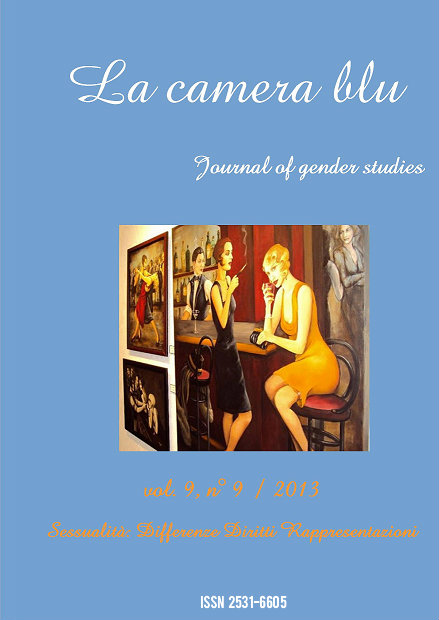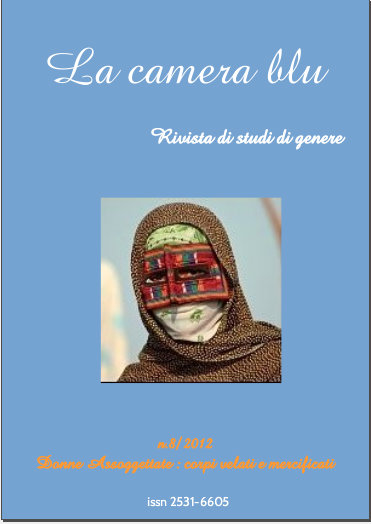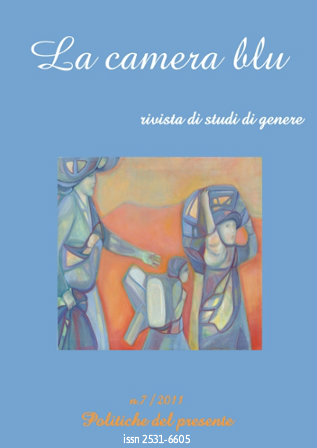Archivio
-
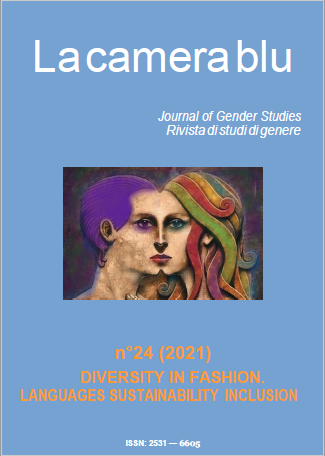
Diversamente moda. Linguaggi, sostenibilità, inclusione
N. 24 (2021)Numero a cura di Maria Rosaria Pelizzari e Debora A. Sarnelli
La moda è il tema unificante del numero 24 di La Camera Blu Journal of Women and Gender Studies, un numero monografico in cui, grazie a una prospettiva interdisciplinare, sono raccolti, intorno al concetto “Diversamente Moda”, saggi che lo attraversano dal punto di vista dell’identità e della fluidità di genere. Trovano inoltre spazio articoli che analizzano l’empowerment dell’impresa femminile e di soggetti percepiti come marginali, nonché contributi che studiano le differenti percezioni e rappresentazioni di corpi ‘al di là degli schemi’. Un percorso che va dalla Storia alla Pedagogia, dalla Sociologia alla Letteratura, alle rappresentazioni teatrali, dalla Filosofia alle Scienze della comunicazione e al marketing. Si cerca di capire sulla base di quali indizi si intravedono oggi, attraverso il marketing inclusivo, prospettive future di tipo culturale e sociale. Fino a che punto la moda può costituire una spinta di mobilità sociale e di innovazione, di abbattimento di stereotipi e di inclusività?
-
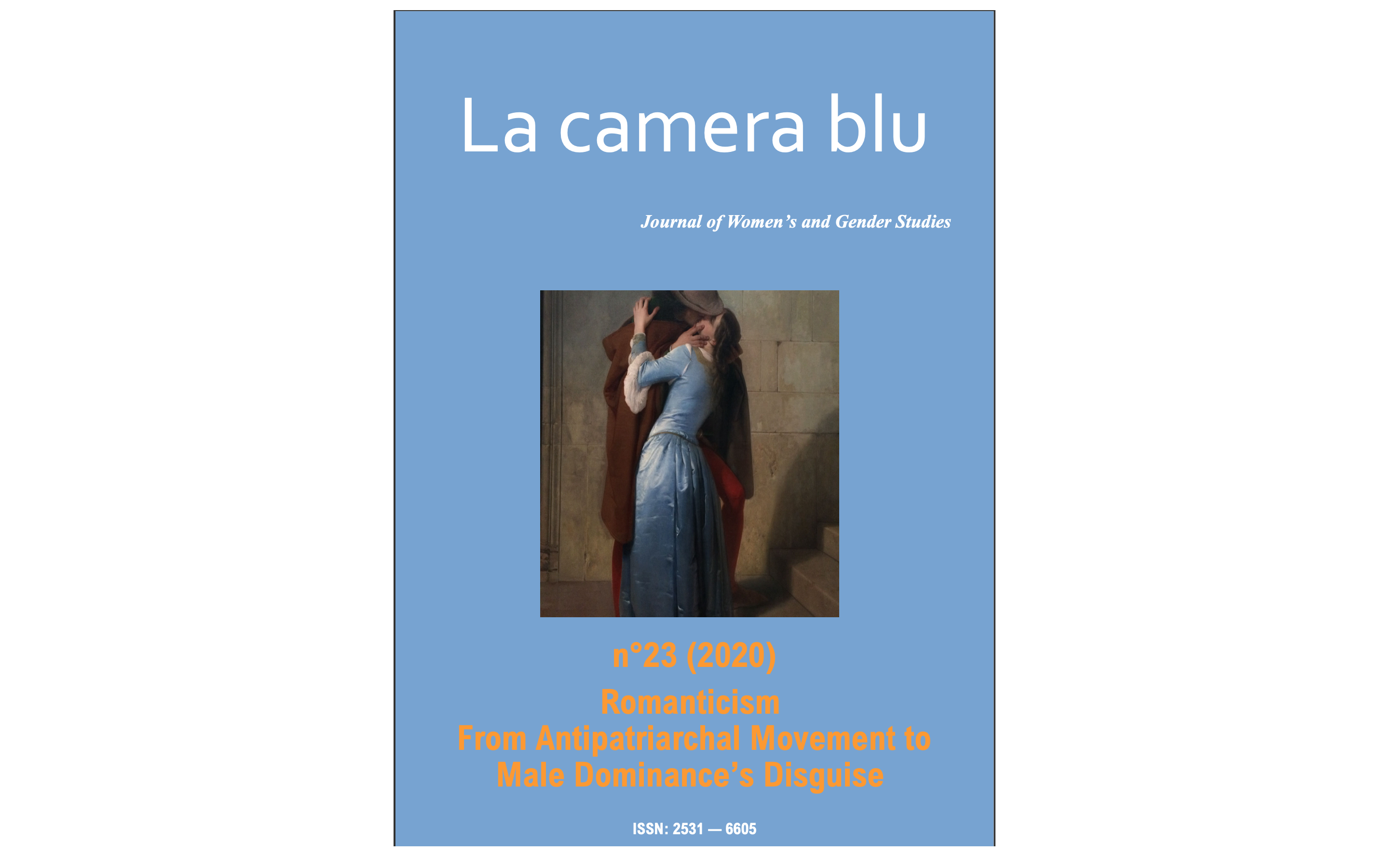
Romanticism. From Antipatriarchal Movement to Male Dominance's Disguise
N. 23 (2020)Numero a cura di Laura Guidi, Judith Muñoz Saavedra e Maria Marchese
Gli articoli presentati nella parte monografica del n.23 de La camera blu intendono, attraverso una prospettiva multidisciplinare – storica, etnografica, sociologica, letteraria – analizzare in che modo il Romanticismo, movimento, se pur contraddittoriamente, anti- patriarcale nelle sue origini sette-ottocentesche, sia stato poi ‘normalizzato’ all’epoca delle politiche capitaliste e nazionaliste della seconda metà del XIX secolo, fino a divenire uno strumento culturale funzionale alla subordinazione delle donne, allo sfruttamento del loro lavoro di cura, e alla legittimazione della violenza maschile.
-
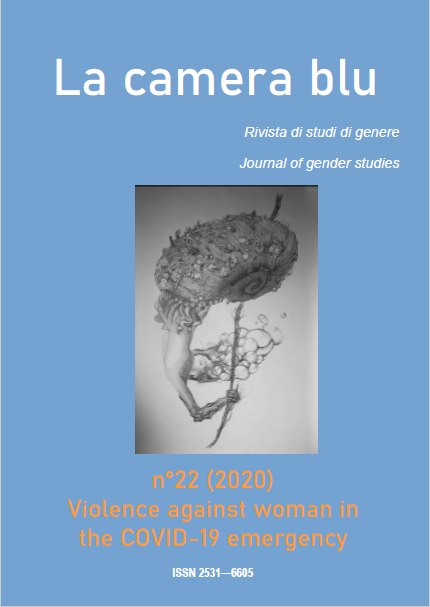
Violenza contro le donne nell’emergenza COVID-19
N. 22 (2020)Numero a cura di Gina Troisi
Immagine di copertina: Massimo Carelli, "Concrezioni"
L’emergenza COVID-19, che si sta diffondendo in tutto il mondo costringendo all’isolamento e alla convivenza forzata, spinge ad una riflessione sull’aggravarsi della condizione di pericolo che le donne vittime di violenza vivono. I centri antiviolenza, le istituzioni e servizi specifici sono chiamati a ripensare a nuove pratiche e misure da adottare per prevenire il rischio, continuare ad assicurare il supporto alle donne e mantenere una rete di sostegno per contrastare la violenza di genere.
Le questioni da ripensare sono tante: la difficoltà di raggiungere i servizi, la crisi economica che ostacola il percorso di fuoriuscita dalla violenza, i procedimenti legali sospesi, la possibilità di riconoscere la violenza al di là di una sua valutazione emergenziale.
Questo numero de "La Camera blu" raccoglie articoli con primi dati di ricerca sul tema, ma anche riflessioni e buone pratiche, allo scopo di condividere conoscenze ed esperienze utili per costruire una nuova sinergia di intervento. -
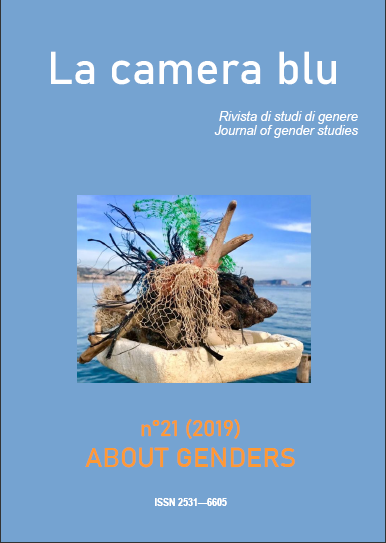
About genders
N. 21 (2019)Questo numero de “La camera blu”, curato dal Gruppo sulle disparità di genere (GDG) dell’Associazione Italiana di Psicologia, presenta una serie di contributi psicologici sulle tematiche che riguardano i generi e gli orientamenti sessuali. Il plurale con cui ci riferiamo al genere ha molteplici significati: da un lato intendiamo approfondire la questione che attiene alla costruzione sociale e culturale del genere e di quanto il corpo (o i corpi) vengano significati secondo un ordine sociale preciso.
-
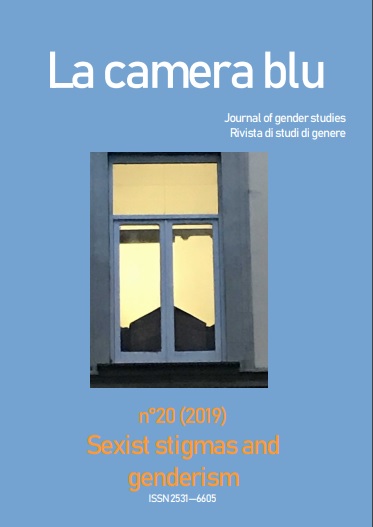
Sexist stigmas and genderism
N. 20 (2019)L’intento di questo issue è stato accogliere contributi che raccontano ed evidenziano, attraverso approfondimenti teorici, di ricerca e di esperienza formativa, come lo stigma sessista e di genere restino ancora radicati nelle relazioni e nei contesti di vita anche quando gli assetti legislativi nonché ideologie collettive sembrino orientarsi a favore delle donne e nel rispetto delle identità di genere
-
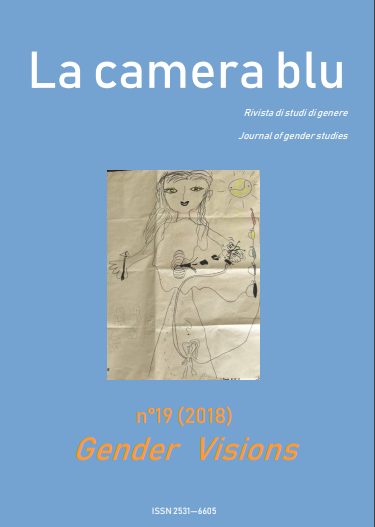
Gender visions
N. 19 (2018)La lotta contro l’oppressione per motivi di genere è caratterizzata dalla rivendicazione di uguali diritti per uomini e donne, dalla costruzione di parità di opportunità, cosi come dalla lotta contro sistemi sociali basati sul diritto del più forte.
La camera blu, pertanto, raccoglie e presenta contributi di ricerca e riflessione che si muovono alla ricerca delle origini delle ineguaglianze e al loro superamento individuando fattori e elementi che sono portatori di discriminazione e sopruso di genere. In questa cornice s’ inseriscono variegate prospettive che interpretano la condizione umana alla luce di effetti legati alla biologia riproduttiva e alla costruzione/decostruzione dei significati attributi alla categoria del genere sessuale. -
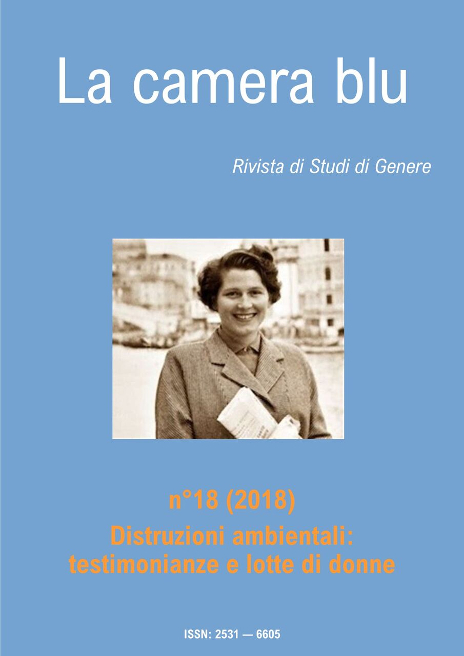
Distruzioni ambientali: testimonianze e lotte di donne
N. 18 (2018)Numero a cura di Laura Guidi
Questo numero de La camera blu nasce dall’esigenza di dare spazio a due ambiti di studio dai fertili intrecci – la Storia ambientale e la Storia di genere - che la storiografia italiana mainstream, in particolare quella contemporanea, ha lasciato al margine come storiografie ‘di nicchia’ o ‘specialistiche’, sottraendosi così al confronto con l’approccio radicalmente critico di questi studi nei confronti del canone storiografico. -
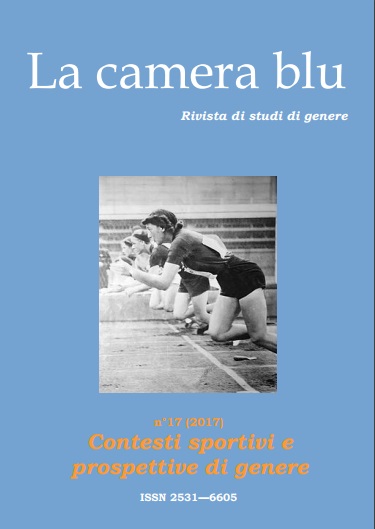
Contesti sportivi e prospettive di genere
N. 17 (2017)Numero a cura di Francesco Muollo e Fortuna Procentese
Il numero prende spunto dagli studi di fine anni Sessanta dove il rapporto tra sport e genere e tra contesti sportivi e attribuzione di stereotipi di genere, ha alimentato una specifica area di ricerca nell’ambito degli sport studies; in tale ambito, ha evidenziato aspetti legati alla segregazione e al bullismo nello sport e all’omofobia.Francesco Muollo, è dottore di ricerca in Studi di Genere presso l’Università degli Studi di Napoli, Federico II. Le sue ricerche, oltre ad approfondire le tematiche sugli studi di genere, si soffermano anche sul rapporto tra corpo e nazione. Attualmente è membro della SISS (Società Italiana Storici dello Sport).
muollo@unina.itFortuna Procentese, PhD, Professore associato in Psicologia sociale e di comunità, presso il Dipartimento di Studi umanistici dell'Università di Napoli Federico II (Italia). I suoi interessi di ricerca riguardano la relazione uomo-donna con una particolare prospettiva sull'asimmetria di genere e sul conflitto lavoro-famiglia. I suoi studi includono il senso di comunità sportivo, processi collaborativi per la rigenerazione urbana e migrazione in una prospettiva di comunità. Inoltre, si è occupata di ricercazione partecipata e metodologie per attivazioni di processi collaborativi.
fortuna.procentese@unina.it -
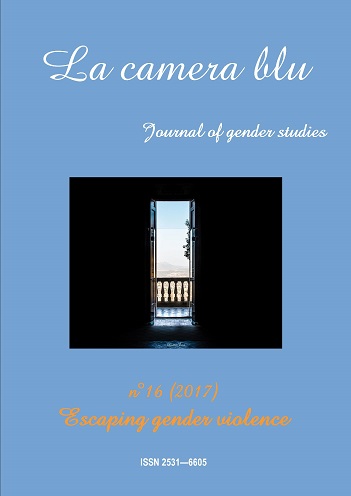
Escaping gender violence
N. 16 (2017)Numero a cura di Filomena Tuccillo
Il numero dedicato al tema della violenza di genere ha il titolo e l’immagine di copertina, scelta dalla redazione, che vogliono segnare una prospettiva di fiducioso sguardo verso le possibilità di contrasto della violenza di genere.
Il primo obiettivo è pertanto fornire riflessioni sul funzionamento della relazione sentimentale, su quelli che sono i ruoli all’interno della coppia nella società contemporanea e sui bisogni ed emozioni all’interno delle dinamiche relazionali; ulteriore scopo è presentare il referto psicologico per le donne vittime di violenza e la 'ri-educazione' di uomini violenti intesi quali ulteriori strumenti per la presa di coscienza sociale e collettiva della violenza di genere quale negazione dei diritti delle donne e dei minori nonché come danno alla salute.
Prostituzione e tratta. “Non sono in vendita” è il titolo del dossier che s’interroga se la prostituzione è una forma di violenza contro le donne al pari di altre o un lavoro come altri. Attraverso il dossier proposto, il numero analizza i temi economici, sociali, legali e sanitari che accompagnano la prostituzione. Attraverso le statistiche internazionali ed europee mettono in luce il collegamento tra prostituzione e tratta e le difficoltà dei Paesi, in cui la prostituzione è legale, a perseguire la tratta.
-
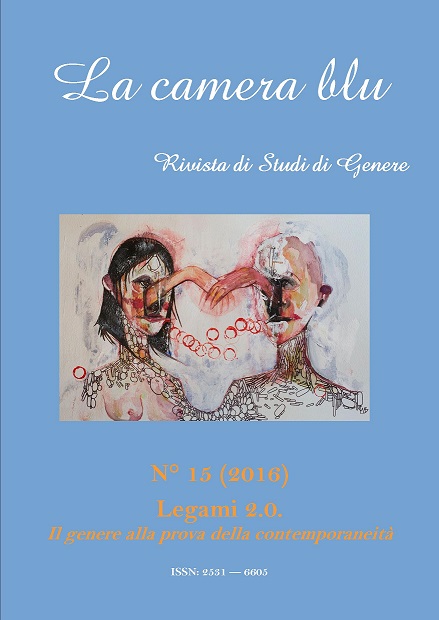
Legami 2.0. Il genere alla prova della contemporaneità
N. 15 (2016)Numero a cura di Anna Gargiulo.
Il numero guarda alle trasformazioni che attengono al genere femminile che vanno oggi configurandosi nella società contemporanea, osservate da una molteplicità di punti di vista disciplinari, come è caro alla Rivista La camera blu. Sfide lanciate sincreticamente a più livelli: corpi, coppie, famiglie, accademie, gruppi sociali organizzati, comunità virtuali. In ogni caso, si parte dai legami, dai link, che tanto possono connettere creativamente quanto legare distruttivamente l’altro a sé. -
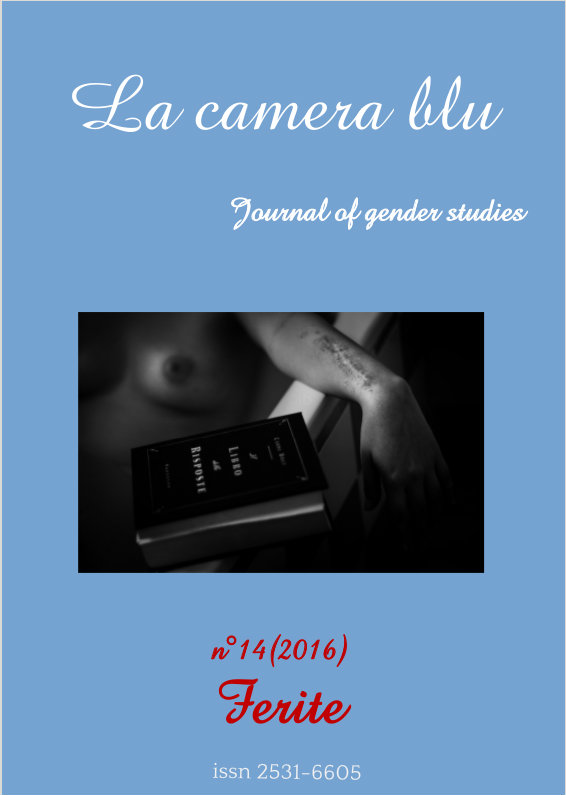
Ferite
N. 14 (2016)a cura di Giorgia Margherita
L’idea centrale che attraversa questo numero è osservare da differenti prospettive e all’interno di scenari multipli il tema delle Ferite, fratture e lacerazioni identitarie iscritte nel soma e incarnate nella psiche. Punto di partenza è la scena corporea: dalle ferite deliberatamente inferte, al fenomeno del Self Cutting, tendenza frequente e diffusa tra adolescenti, principalmente ragazze e giovani donne, di tagliare e ferire la superficie della propria pelle. -
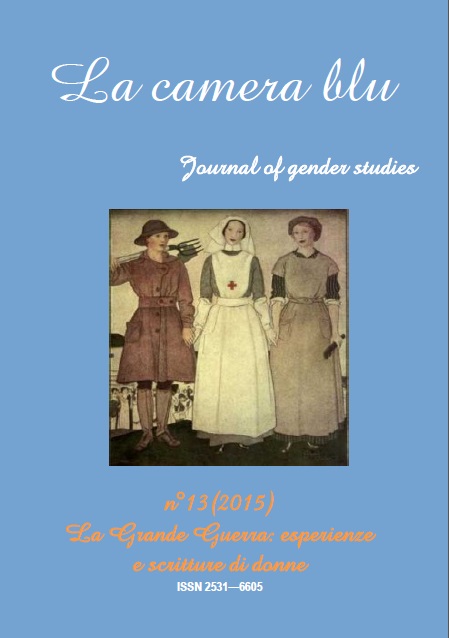
La Grande Guerra: esperienze e scritture di donne
N. 13 (2015)a cura di Laura Guidi e Annamaria Lamarra
Con questo numero riprendiamo il discorso iniziato dieci anni fa da La Camera Blu, quando si volle scegliere come tema proprio la guerra; la decisione di privilegiare una tematica controversa nella storia e nella cultura femminile, che in molti casi ha segnato lo stesso movimento delle donne e la lotta per il diritto al voto. Mentre nel 2006 il nostro tema era la guerra, analizzata in una serie di contesti, in questo numero si parla di una guerra, che segnò un punto di svolta nella storia di uomini e donne: la Grande Guerra di cui ricorre l'anniversario. Le scritture nelle quali le donne raccontano la propria esperienza della guerra offrono punti di vista nuovi che ampliano le consuete ricostruzioni storiografiche, sottolineando connessioni tra individuo e collettività, tra pubblico e privato, tra memorie private e storia generale.
-
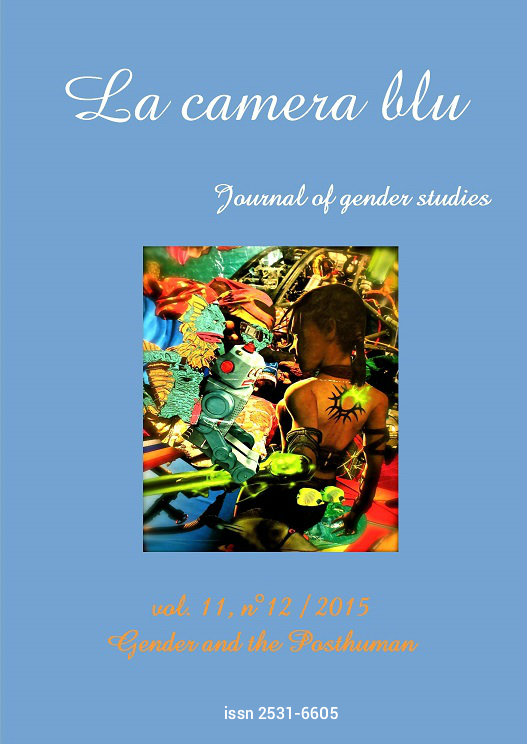
Gender and the Posthuman
N. 12 (2015)A cura di Francesca Ferrando, Simona Marino e Caterina Arcidiacono
Questo numero de La camera blu è un importante contributo agli studi di genere e al postumano per diverse ragioni. Attualmente, il postumanesimo è entrato a far parte del discorso accademico piú alla moda. Questa svolta rappresenta, da un lato, una grande opportunità di riforma sociale, dato che l'antropocentrismo sta portando a un disastro eco-ambientale così profondo da mettere a rischio la sopravvivenza stessa della specie umana. D'altro lato, l'appropriazione egemonica del discorso postumanista apporta anche una mistificazione del significato stesso del postumanesimo, con ironiche conseguenze. Il soggetto “neutro”, ossia maschile, bianco, eterosessuale, occidentale etc., sta riscoprendo il postumano nel nome del Padre, in una ricostruzione astorica in cui il contributo determinante del femminismo viene pian piano rimpiazziato da nomi di teorici maschili, per assicurare una genealogia fallocratica agli studi postumani. È questa una sconfitta postumana? Tutt'altro. Il successo che il postumanesimo sta suscitando può solo soddisfare studiose che da anni si impegnano alla sua promozione. Ma in questa proliferazione del postumano, che porta il significato stesso del termine ad assumere diverse tonalità, colori e sfumature, è di cruciale importanza riscoprire le sue radici. Il postumanesimo nasce dal femminismo: dimenticare questo debito genealogico significa rinunciare all'identitá più profonda del postumanesimo. Questo numero intende da un lato sottolineare questa potente genealogia. Dall'altro, si vuole porre come piattaforma per ulteriori sviluppi del genere attraverso il postumanesimo, e del postumanesimo attraverso il genere, riflettendo sui futuri possibili del genere in relazione alle specie umane e postumane.
-
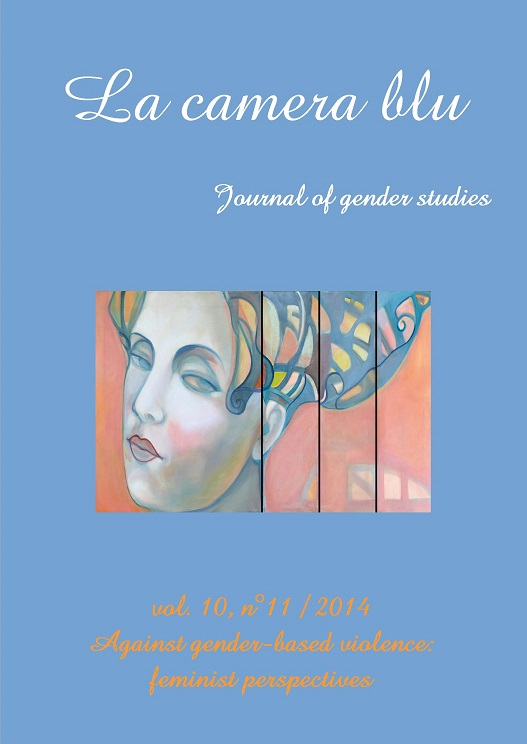
Against gender-based violence: feminist perspectives
N. 11 (2014)Editors: Ines Testoni, Adriano Zamperini, Gabriela Moita, Mihaela Dana Bucuţă and Caterina Arcidiacono -
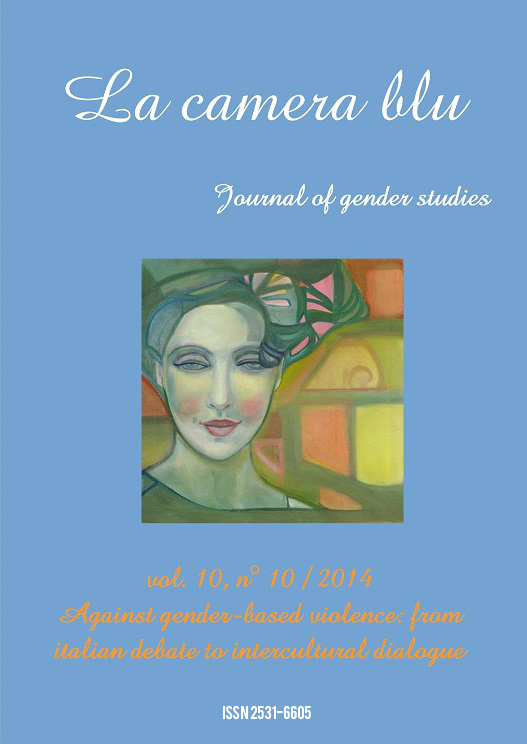
Against gender-based violence: from Italian debate to intercultural dialogue
N. 10 (2014)Editors: Ines Testoni, Adriano Zamperini, Gabriela Moita and Mihaela Dana Bucuţă
-
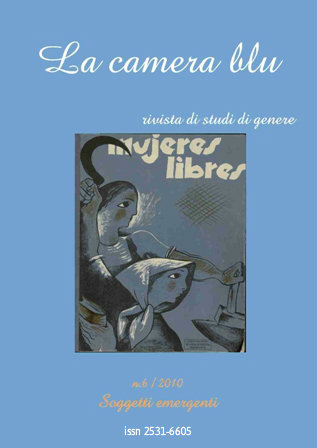
Soggetti emergenti
N. 6 (2010)Soggetti emergenti raccoglie esperienze, sia storiche che riferite al presente, di transizione da condizioni di subalternità e alienazione all’affermazione di soggettività, nella forma di iniziative autonome e di elaborazione di analisi e discorsi capaci di dar voce a un sé prima silente.La prospettiva di genere è presente in ciascuno dei testi presentati, sia che si parli (come nei contributi di Botti, Amistà, Cimbalo, Pelizzari) di movimenti e organizzazioni specificamente femminili, sia che un ruolo protagonista delle donne emerga nell’ambito delle comunità analizzate (Sgueglia, Zito). Al tema del “divenire soggetti” fa riferimento anche il report dell’associazione LBS su un incontro di studi dedicato alla educazione e alla pedagogia di genere. Nella vicenda esistenziale di Marie Cardinal analizzata da Lamagna è la scrittura a consentire l’emergere della soggettività e a divenire strumento di libertà interiore. Vanke sottolinea il valore terapeutico della narrazione, grazie alla quale i reduci russi della guerra afghana del 1979-89 si riappropriano di una memoria precedentemente inscritta solo nei loro corpi. Completano il volume la recensione di Catarzi di uno studio di Claudia Montepaone sulle filosofe pitagoriche, la “rilettura” di Lamarra di un libro che rievoca l’esperienza di formazione di alcune protagoniste della cultura femminista degli anni Settanta, e la rubrica L'evidenziatore, dedicata in questo numero alle precarie e ai precari della conoscenza. -
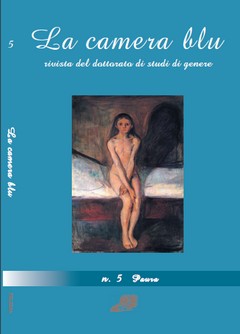
Paura
N. 5 (2009)La paura è un sentimento che accompagna la nostra vita. Può declinarsi in molti modi e assumere tonalità differenti, occupando lo spazio interiore e manifestandosi in sintomi che piegano il corpo; o diventare strumento di repressione e controllo sociale. E’ un sentimento complesso che ha origini molteplici, difficili da rappresentare in una forma unitaria. Può esprimersi nel timore di perdere la relazione con l’altro, originata nell’ansia che provoca la separazione dal corpo materno. E’ molto spesso connessa con la violenza: quella (frequentissima) maschile su corpi di donna, ad esempio; o quella subita in guerra dal soldato costretto ad aderire a un modello di virilità che stigmatizza duramente ogni manifestazione di paura.
Questo numero raccoglie riflessioni teoriche, esperienze di ricerca, testimonianze, progetti di educazione e trasformazione nei quali questo sentimento, tanto profondo quanto difficile da definire, svolge un ruolo chiave.
-
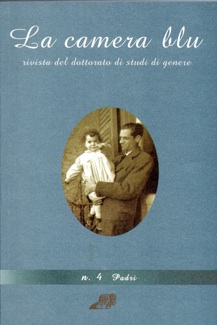
Padri
N. 4 (2008)Nell’ambito degli studi di genere la dimensione della maternità ha lungamente offuscato quella della paternità, che comincia solo in tempi recenti ad essere oggetto di specifiche indagini, volte a esplorare cosa abbia significato essere padri in contesti ed epoche diverse. Non c’è da stupirsi per il ritardo negli studi: per lunga tradizione le donne sono state rappresentate e narrate soprattutto nella loro sfera e nelle loro virtù private, gli uomini in quelle pubbliche. Spesso la paternità è stata vista come un elemento costitutivo del ruolo pubblico, conferendo status e prestigio al pater familias. Ma come è stata vissuta la relazione paterna nell’intima esperienza di padri, figli e figlie? Attraverso l’analisi di casi specifici di relazione paterna e saggi che affrontano aspetti generali dell’argomento in chiave sociologica, filosofica, antropologica e storica questo numero intende contribuire ad un tema d’indagine recente e innovativo.
-
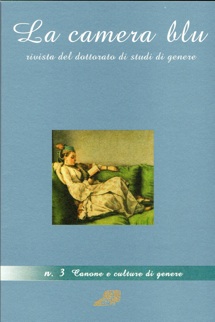
Canone e culture di genere
N. 3 (2008)Se per canone si intende il criterio normativo che disciplina un campo di ricerca scientifico, è evidente che gli studi di genere abbiano avviato un’attenta riflessione critica sui singoli statuti disciplinari. Questo numero della rivista si propone di raccogliere e mettere a confronto espressioni significative di tale riflessione, nella prospettiva non già di integrare l’organizzazione canonica dei saperi con qualche frammentario supplemento di una cultura di genere banalizzata e depotenziata, ma di decostruire la tradizione culturale del Soggetto unico che si autoproclama universale e neutro, camuffando la sua parzialità di soggetto maschile, eterosessuale, appartenente all’élite. E’ questa l’unica strada per aprire i canoni disciplinari a nuovi paradigmi euristici e interpretativi e valorizzare la pluralità delle esperienze e dei soggetti.
-
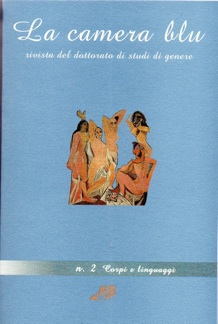
Corpi e linguaggi
N. 2 (2007)Tra una natura identificata con la passività e la ripetitività - in cui scienziati e legislatori hanno iscritto per millenni il ‘destino biologico’ femminile, la sessualità, le relazioni di genere, sottraendoli alla relatività/ mutevolezza della Storia e fissandoli in uno statuto di immutabilità -, e la Storia, il Logos, la dimensione del Soggetto attivo e creativo (maschile per definizione), la cultura occidentale fin dalle sue radici classiche ha stabilito una contrapposizione binaria, una reciproca alterità.
Uno dei contributi più profondamente critici e innovativi introdotti dai gender studies nell’ambito delle conoscenze - sia ‘umanistiche’ che ‘scientifiche’ - è stato la scomposizione di quest’antica dicotomia e il mostrare come corpi e linguaggi siano tra loro in relazioni molteplici di contiguità e osmosi, e soprattutto in relazioni di potere nelle quali il corpo del singolo – uomo o donna – è iscritto in una rete di prescrizioni, censure, significazioni. Questo numero presenta studi che indagano il corpo come dimensione culturale e storica.
-
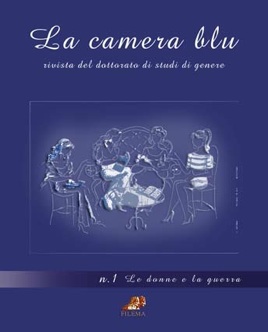
Le donne e la guerra
N. 1 (2006)Nelle rappresentazioni canoniche della guerra il protagonista attivo è sempre l’uomo, il combattente, rappresentato nel pieno della sua virilità e (patriottica e giusta) aggressività. La donna in ogni discorso pubblico sulla guerra compare di solito come metafora di un bene da difendere: la patria, appunto, la terra degli avi, minacciata, esposta alle invasioni, passiva. Eppure nelle guerre le donne non sono mai state passive, a cominciare dalla mitica Antigone. E spesso hanno introdotto una dimensione ‘terza’ rispetto alla logica dello scontro e della negazione frontale. Spesso, da Antigone alle donne del Sud che parteciparono ad una dimenticata resistenza antinazista dopo l’otto settembre, le donne in guerra si attivano per salvare vite e al tempo stesso per preservare i valori etici e morali della propria comunità e della comunità universale, che la guerra distrugge insieme con i corpi.
Rifiutando ogni visione essenzialista che identifichi tout court le donne con la pace, questo numero racconta percorsi ed esperienze di donne attraverso le guerre.

